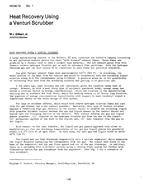Architecture Hall, one of the oldest buildings on the University of Washington campus, was built in 1909 and renovated in 2005. The building had originally been designed with natural ventilation, and during the renovation process, this natural ventilation function was reactivated. The building is in use from September to June when outside temperatures in Seattle are quite low. The natural ventilation function works in some building locations by buoyancy effect and in others by cross-ventilation. The operation of natural ventilation depends upon the occupants manually opening windows. In order to assess the performance of the naturally ventilated spaces inside Architecture Hall, CO2 concentrations were measured extensively over the past two years using instrumented carts. These CO2 concentrations are significant for two reasons. First, the build-up of CO2 levels is regarded as a good indicator of inadequate ventilation rates and, second, increased CO2 concentrations correlate with the potential of Sick Building Syndrome. This paper discusses measured CO2 concentrations in the naturally ventilated spaces in Architecture Hall and their dependence on window operation.
Citation: ASHRAE Conference Papers, 2010, vol. 116, pt. 2, Albuquerque, NM
Product Details
- Published:
- 2010
- Number of Pages:
- 5
- File Size:
- 1 file , 1.5 MB
- Product Code(s):
- D-AB-10-C005


